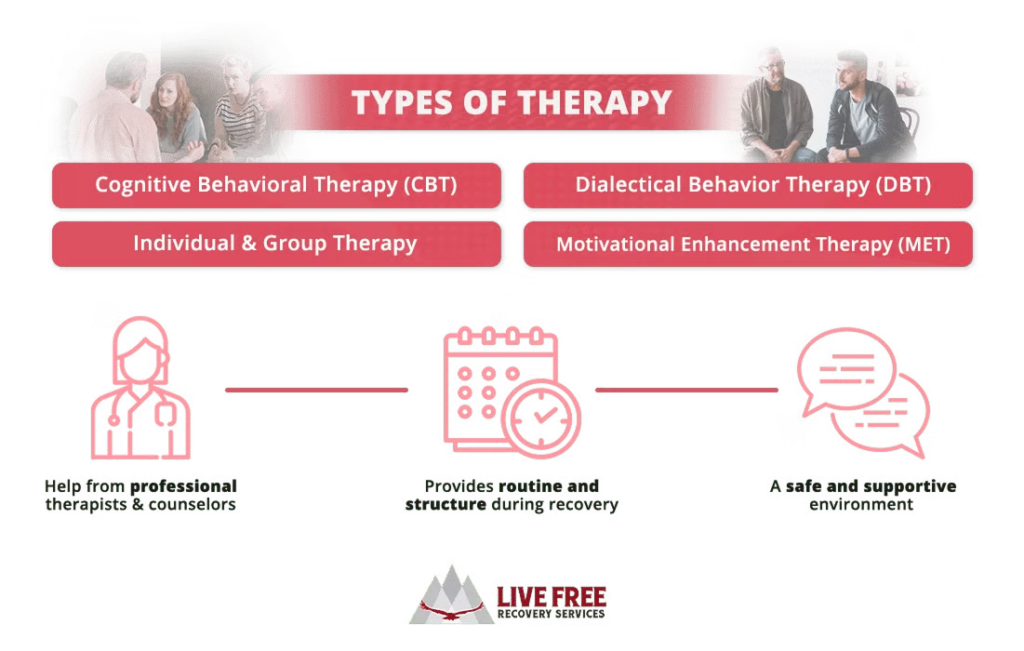Therapy for Addiction Treatment
Addiction is considered a complex disease that affects a large amount of today’s population.
Home > Therapy
Addiction is considered a complex disease that affects a large amount of today’s population. Substance use disorder requires individualized treatment methods that address underlying symptoms and causes of the disease, along with the consequences. This occurs because engaging in substance abuse can negatively impact a person’s life.
For example, engaging in substance abuse can impact an individual’s physical and mental health. It can also impact an individual’s ability to excel in work or school, or ability to function at home or at social events. Fortunately, there are several types of treatments for addiction options.
What Is Addiction Treatment Therapy?
Addiction treatment therapy is behavioral therapy utilized for drug and alcohol addiction. The benefits that therapy for drug addiction intel are the following:
- Therapy can increase life skills and teaches individuals how to manage triggers, stress, and high-risk circumstances in addiction recovery.
- Addiction therapy alters an individual’s attitudes and behaviors toward drug use.
- Therapy provides incentives for patients’ sober living.
- Addiction therapy engages patients in SUD treatment.
Even if a patient isn’t attending addiction treatment therapy by their choice, therapy can assist that patient by breaking down resistance. Therefore, opening up the individual for an opportunity to recover. Even though there isn’t a single effective cure for addiction, behavioral counseling and therapy act as vital tools to mitigate relapse and educate individuals on how addiction affects them.
Importance of Drug Addiction Therapy
Therapy for drug addiction is important. In addition to the patient completely stopping engaging in drug use, there are several more goals. One of the goals is to have individuals return to productive functioning in the workplace, community, and with the family. If you’re interested in learning more or looking for referrals, start by accessing the Substance Abuse and Mental Health Services Administration (SAMHSA) for assistance with addiction.
Most of the individuals that decide to attend treatment do the following:
- Improve their social, psychological, and occupational functioning
- Decrease their criminal activity
- Stop using drugs
For example, methadone and buprenorphine treatment has increased participation in behavioral therapy. Therefore, decreasing both criminal activity and drug use.
However, the outcome of individual therapy depends on the following:
- The quality of interaction between the patient and their treatment healthcare providers
- Appropriateness of treatment and related services used to address issues
- Extent and nature of the patient’s problems
Similar to other chronic diseases, addiction can be successfully managed. Treatment enables patients to counteract the powerful and disruptive effects of addiction. Especially what it has on a person’s behavior and brain, so control over their life can be regained.
Addiction Therapy for Relapse Prevention
The chronic nature of addiction as a disease suggests that relapsing to drug abuse isn’t just possible, but likely. The unfortunate aspect is once relapse occurs, various individuals deem it a failure. However, this is not the case.
Successful addiction treatment therapy requires continuous assessment and modification as deemed appropriate. This is similar to the approach taken for other chronic diseases.
For example, if a patient receives active treatment for hypertension and the symptoms decrease, the treatment is deemed successful. Even if the symptoms recur after the treatment has been discontinued.
For the individual addicted to a substance, a relapse in drug abuse doesn’t suggest failure. It means that the current treatment options need to be adjusted. Over time, needs will change, and so should treatment plans.
Common Types of Therapy for Addiction Treatment
It has been demonstrated the effectiveness of treatment approaches utilizing contingency management principles. This form of therapy for drug addiction involves giving patients tangible rewards to reinforce positive behaviors such as abstinence. There were studies conducted that showcased both psychosocial counseling and methadone programs working in conjunction.
The above-mentioned programs illustrate that incentive-based interventions are considered highly effective in promoting abstinence from drugs and increasing treatment retention. If an individual is hesitant about attending treatment, motivational enhancement therapy is used.
Individual Therapy
One of the most common forms of therapy is individual therapy. This involves the therapist and the patient. During every therapy session, the therapist will assist in guiding the patient in a manner that can address the underlying psychological components of their addiction.
Group Therapy
Group therapy is designed to assist every member involved by sharing experiences, learning from one another, and addressing common substance abuse concerns. Through group therapy, individuals can start opening up, healing, and bonding like never before. The sessions are conducted by the addiction treatment providers who structure the group topics and meetings.
Cognitive Behavioral Therapy
Cognitive-behavioral therapy (CBT) assists patients in uncovering problematic thoughts or feelings that can sabotage a life of sobriety and create a relapse. It is based on the idea that negative thought patterns can lead to undesirable actions, emotions, and problematic behaviors. From there, contradictory thoughts and undesirable emotions can occur. Behavioral therapy is perhaps the most commonly utilized type of substance abuse treatment that is frequently used during substance rehabilitation.
There is an interconnection between feelings, thoughts, and behaviors at the core of CBT. During a CBT session, the counselor will learn the patient’s negative thoughts and feelings that led to substance abuse. The thoughts and feelings that the patient had after using will also be exposed.
After that process, the treatment provider will search for cognitive distortions that help in feeding these behaviors. CBT can be useful in treating several mental health conditions, such as:
- Anxiety
- Eating disorders
- Bipolar disorder
- Depression
- Anxiety
Dialectical Behavior Therapy
Dialectical behavior therapy (DBT) is a therapy style that is influenced by CBT. During DBT sessions, intense mental disorders such as obsessive-compulsive disorder (OCD) are treated with substance use disorders (SUD’s). DBT works to reduce cravings and help patients avoid situations or opportunities to relapse.
The DBT therapists strive to assist patients in regaining self-esteem, removing addiction triggers in their life, and learning stress-management skills. Since the origin of DBT, it has been found beneficial alongside other mental health issues such as:
- Post-traumatic stress disorder
- Substance use disorder
- Anxiety disorder
- Eating disorder
- Mood disorder
Motivational Enhancement Therapy (MET)
This counseling approach assists individuals in resolving their ambivalence about engaging in addiction treatment and stopping their drug use. It aims to induce internal and swift motivated change rather than guide the client through the recovery process step by step. The first session is followed by four to five sessions afterward.

In the initial session, the therapist provides the patient with feedback on the assessment, stimulating discussion about eliciting-self motivational statements and personal substance use. The principles in MET are utilized to help build a change plan and strengthen motivation.
There are coping strategies that are suggested and discussed with the patients regarding high-risk scenarios. In later sessions, the therapist will review strategies, and continue to encourage committed change or sustain abstinence. Oftentimes, patients are encouraged to bring a significant other to the sessions. Overall, this approach has been utilized successfully with individuals that are addicted to alcohol to reduce their drinking problem and engagement in treatment. MET has also been successful with adults that are marijuana dependent when combined with cognitive-behavioral therapy. Motivational enhancement therapy is for individuals struggling with heroin, nicotine, opioid and cocaine. It also assists with helping adolescents who tend to use several drugs. Overall, MET is most effective for engaging individuals in drug treatment.
The Matrix Model
This therapy approach provides a foundation for engaging stimulant individuals in treatment and assisting them in achieving abstinence. Generally, the two substances are cocaine and methamphetamine. Patients learn about the following:
- Receive support and aftercare direction from a trained therapist
- Issues that are crucial to relapse and addiction
- Become familiar with self-help treatment programs
During this approach, patients are monitored for drug use through urine testing. The therapist will function as a coach and teacher simultaneously. This helps to foster an encouraging and positive relationship with the patient and use that relationship to reinforce positive change.
The interaction between the patient and the therapist is direct and authentic, but not parental or confrontational. Therapists are trained to conduct the treatment sessions in such a way that it promotes the patient’s dignity, self-worth, and self-esteem. The positive relationship between the therapist and patient is crucial for patient retention.
Treatment materials draw heavily upon other treatment approaches and include elements of the following:
- Family and group therapies
- Self-help participation
- Relapse prevention
- Drug education
The detailed treatment manuals include worksheets for individual sessions and several other components that include:
- Early recovery skills groups
- Relapse prevention groups
- Family education groups
- Social support groups
- Combined sessions
- 12-step programs
- Relapse analysis
- Urine tests

12-Step Facilitation
This therapy approach is considered an active engagement strategy that is designed to increase the likelihood that an addict will become involved. 12-Step programs excel in promoting abstinence. The three key ideas of this approach are:
- Acceptance – This includes the realization that drug addiction is progressive and chronic which nobody has control over. Life has become troublesome because of drugs and willpower alone isn’t sufficient enough to overcome the issue. Abstinence is the way.
- Surrender – The next step involves giving over oneself to a higher power and accepting the support structure and fellowship of other recovering individuals that are addicted. It’s essential to follow the recovery activities that are laid out by the 12-step program.
- Active involvement – This is related to activities. Overall, this treatment method appears to promise to help drug users sustain drug addiction recovery.
Dialectical Behavioral Therapy
To sum up, addressing lean addiction in New Hampshire depends on a comprehensive approach because of the way it impacts not just young adults but families and communities as a whole.
Treatment programs for this type of substance abuse are typically tailored to the individual’s needs and unique circumstances. Yet, they generally consist of medical detox, behavioral therapy, as well as individual, family, and group counseling sessions. They also focus on co-occurring disorders and dual diagnosis designed to mitigate the impact of lean addiction, ensure long-term sobriety, and provide hope for the future.
Did this article answer your questions?
"*" indicates required fields
Take the First Step Towards a Brighter Tomorrow
At Live Free Recovery, we’re committed to walking alongside you on every step of your journey. Our compassionate team is here to provide the guidance and support you need to overcome addiction and reclaim your life. Don’t wait—reach out today to speak with someone who truly understands your struggles and can help you take that important first step toward healing and a fresh start.
Your path to recovery starts here.
